#Apollo meta
Text
Now, I’m not sure if anyone in the TOA fandom has ever mentioned “Tongs A Lot, Dad”, a short story found in Camp Half-Blood confidential, but I strongly believe it adds (or perhaps reinforces) a lot when looked at with the additional context and characterisation the Trials of Apollo provides.
An almost diary entry like addition in the short book, the story is told by Connor Stoll, following him and his brother as they poke around the old attic where the Oracle of Delphi remained for decades in the interest of scoring loot. At this they are semi successful, as they are made almost ridiculously vital to the canon plot of HoO with the find of celestial bronze tongs, which are inscribed with the instructions “for plucking the Tartarus Napkin from fire”. And if you are reading this post, you probably have a pretty good idea of why that’s important.
Now, what does this have to do with Apollo? Well, I find it highly probable that this was Apollo’s doing, for multiple reasons.
1. The tongs were found in the oracle of Delphi's old abode, which is obviously Apollo’s domain, a place you would think he’d be very familiar with- the original place of the Oracle of Delphi was sacred ground, in fact, and even if that doesn’t quite translate to modern day... there is that theory about him being Camp Half Bloods Patron, pioneered by @tsarisfanfiction, I believe. Whatever hold the ancient laws have on the gods, I think we can somewhat assume that places such as these allow more wriggle room.
2. This notably happened basically simultaneously with Rachel becoming the Oracle, as seen here, “While everyone else was waiting to see if Rachel, the new Oracle, would survive....we made our move around to the back door of the Big House.” At this point, we’ve just wrapped up PJO. How would Apollo of known to set this up now? Well, we already know from Octavian in SoN that Apollo talked to him personally, and that their talk must of happened before Olympus closed, because he was stuck on Delos after. So if Apollo can put that into play, why not set up this? After all, Apollo is the god of prophecy - he could of understood it was needed. He obviously knew there was a threat.
3. In the books (before ToA) we only see Apollo in Camp Half Blood twice- once to take Percy’s group and the hunters there in TTC, and once at the end of PJO to, as Conner so delightfully puts it, wait to see if Rachel would survive the Oracle. He was right there. And if that’s not enough for you, the reason Conner picks out the bag with the tongs? A “beam of golden light, shot upward from the floor” startles him. We find out later in another story that Apollo is directly confirmed to have been the one to do this- gifting Rachel the famous tripod stool of the Oracle. It fits almost to well.
“But!” You might say, protesting, “The title confirms who did it! I mean, it’s not like Apollo is Connor Stoll’s dad!” And to that I say- although the title does suggest that Hermes is responsible, it’s never confirmed, and more importantly- it’s in Connor’s POV. Why shouldn’t he assume it’s his dad? And why would he know otherwise? Perhaps you could make another connection with Hermes due to his shrine in Tartarus and point at that as his involvement, but wouldn’t it make more sense if Apollo knew it was a Child of Hermes who had to have the tongs, and acted accordingly? Afterall, last we saw Hermes he had a significant grudge against Annabeth, and more importantly has done nothing to suggest he’s capable of such foresight, especially at this point.
Now that I have (hopefully) convinced you of Apollo’s involvement, another titular question must be answered- why does it matter? What’s the ramifications of this? Well, considering that this napkin basically ends the civil war between the Greeks and the Romans... a lot, actually. Specifically, it allows Annabeth to communicate that reconciliation can be reached if Reyna, a Roman, returns the Athena Parthenos, an important Greek statue to the Greeks. (Also interesting to note she addresses this to Rachel, Apollo’s Oracle... another subtle connection).
In ToA, Zeus punishes Apollo mainly for two stated reasons: Revealing the Prophecy to soon, which becomes pretty clear is not how prophecy works. And encouraging Octavian to declare war on the Greeks. But wait? If the Napkin succeeds due to Apollo, that means that he is trying to stop the war, which in my opinion follows more along with his characterisation in ToA. So what happened with Octavian? The fact of the matter is, people more clever then me have attempted to solve this question, such as @zazzander and @fearlessinger (Highly recommend this post if you are interested in the topic!)
The tongs (and thus the potential for the Napkin) was put into place months before any true threat would be realised by most characters. So it wasn’t a frantic backpedal of trying to fix his mistakes to avoid punishment by Apollo. It was deliberate. Premeditated. Now, it could be that Apollo just knew the tongs would be needed, but not what for. Unfortunately, we don’t know how his powers work. But that’s boring. However, if you take the view that Apollo’s communication with Octavian was part of a larger strategy to reunite the camps... (again, see the linked post). Well. Funny thing, because that’s exactly what the Napkin facilitates. The two camps stop fighting because of this one, simple message, and the effect it had. They focus on the true enemy. Gaia.
What does this tell us then about Apollo, then?
Well...not much new, surprisingly. ToA does it’s job well. We know Apollo cares, deeply, about his kids and demigods as a whole. We know he often acts subtly, through quiet actions that he’ll never admit to. It’s maybe the final piece of evidence you could point to and say definitively that Zeus’s punishment was unjust, but we already knew that (although funnily enough, Zeus doesn’t- and even if he did, he’d probably just point to the violation of the interference laws and punish Apollo anyway.) What it does is add on to a very firm characterisation that ToA finalises, and showcases how once again Apollo is so much more then he first appears.
#Did I focus way to much on a story of dubious canon?#Yes#Do I regret it?#No#Apollo meta#Apollo#ToA Apollo#Pjo Apollo#PJO#TOA#Trials of Apollo#lester papadopoulos#I have been meaning to do this for ages#I just think it's a really neat detail... but it just kept getting longer#Oh well#this meta is just me being insane for#roughly 1k words erbherf
202 notes
·
View notes
Text
that scene in I Become Supreme Lord of the Bathroom where it cuts from Luke to show Percy flossing and doing a bunch of other random crap is the most accurate representation of ADHD to ever exist
#percy series#percy jackon and the olympians#percy jackson#percy pjo#percy and annabeth#percabeth#pjo meta#pjo fandom#pjo series#annabeth pjo#pjo#pjo apollo#pjo disney+#pjo headcanon#pjo hoo toa#pjo stuff#pjo tv show#pjoverse#adhd#actually adhd#adhd problems#adhd brain#adhd things#neurodivergent#neurodivergence#neurodiversity#dyslexia#neurodiverse stuff
1K notes
·
View notes
Text
Something I really appreciate about TOA that I don’t see get talked about much is that I never get the sense that Apollo finds Lester ugly.
For all that he complains about the body he’s stuck in, I never got the feeling that it came from a distaste for Lester himself. When he sees Lester’s traits reflected in others, like Meg being chunky, he is completely unaffected by it. Finds it charming, even. (In fact, the only times I can remember him having Opinions about how someone looks is when they’ve chosen something about their appearance that he either approves or disapproves of, like a tacky jacket/hair cut or when he finds someone attractive. The only time I can remember him calling anybody ugly was when he pointed out that Dionysus was choosing to look as ugly as possible to piss of Zeus, which is a statement of fact and doesn’t necessarily mean he thinks that Dionysus’ form is actually ugly. He makes no mention of finding it so before or after that line. It’s a statement of fact that Dionysus is choosing a form that either he or Zeus finds ugly to piss of their dad.)
The thing about Lester is that he is so devastatingly mortal. He has flab and acne and no upper body strength and his voice squeaks when he’s nervous and he sweats a lot and he has a silly name and messy, curly hair that’s impossible to tame. He is the Most Teenager To Ever. There is no godly blood running through his veins, no powers he can call upon. If Apollo were to run into him in the street, I don’t think he’d pay him much mind. He’d probably just think, “sweet kid”, and move on. If he got to know him, I think Apollo would adore him because that’s just who rrverse!Apollo is. He loves mortals despite himself, flaws and all. He’d argue against anything bad Lester had to say about his own appearance and mean every word.
The problem is that it’s Apollo in this body. Apollo, The Golden Child, the perfect son, a God. His distaste for this body is because Lester is so devastatingly mortal and imperfect. Apollo has to be perfect, he has to be shiny and pretty and strong because he has nothing else to offer otherwise.
And.. I dunno, there’s something about Apollo hating the things that draw him to others when it’s him. The flaws that he tears apart in himself he finds endlessly charming on others, or he thinks that they have better reasons for why they have them, or he thinks they have enough positive traits to counteract them. The positive things that he hides deep enough that even the reader can’t see right away, like his kindness and genuine desire to understand and connect with everyone around him, that he’s shocked to find directed at him in turn.
That Apollo accepting himself and reclaiming his personhood leads to him being comfortable with being Lester, imperfect and mortal as he is. That he takes that imperfection back with him to Olympus… I dunno man I’m Emotional. Also it’s just plain nice that Lester is never treated as ugly for looking like a normal ass teenager, even by the guy stuck in this body. That’s neat.
Or maybe I’m just rambling and this means nothing at all and I’m reading too far into Blorbo from my books.
#DOES THIS MAKE SENSE. is this too rambly. AUGH.#words machine ALWAYS broke and I forget everything I’m trying to say the moment I try to write or type it out#which results in long ass posts like this. this could’ve been 3 sentences probably#TOA#trials of Apollo#rrverse!apollo#lester papadopoulos#snack time#should I tag this as meta?? I dunno
706 notes
·
View notes
Text
Listen, ok listen. Apollo is fundamentally a very normal guy. Sure he has magic powers, and sure his backstory is insane, but he himself is just. A guy. An all considered well adjusted guy. He's hinged. By far the most regular attorney in the serie.
That's what makes his relationship with Klavier so compelling, because Klavier, for all he is a campy rockstar, is also a fundamentally normal guy, so the two of them create an united front. They have this thematic synergy : common sense and basic cooperation triumohing over the batshit insane mess of the legal system.
But, Apollo being just a regular guy, is crucially what makes his relationship with BLACKQUILL the funniest shit in the entire serie by far.
Normal guy vs Hell murderer samurai with a sword
Regular attorney vs Insane emo band leader
Guy who can see really good vs Guy who can shatter metal with his bare hands
Aa5 is HILARIOUS and amazingly fun to play just because of that
380 notes
·
View notes
Text
There's lots of gay subtext in Ace Attorney.
But when looking specifically at subtext that might be intentionally put in the narrative by the creators with the intention that the character in question is actually gay, I think the main character with the most evidence behind this is actually Apollo Justice.
Our other main characters, Phoenix Wright and Athena Cykes both have obvious subtextually heteronormative romantic partners. To an adult, straight, culturally normative audience, Phoenix Wright and Maya Fey read normatively as an obvious romantic pairing. This is also the case for Athena Cykes and Simon Blackquill. In Great Ace Attorney the same can be said for Ryuunosuke and Susato.
I repeat– to an adult, straight culturally normative audience, the romantic subtext between these characters is clear. If you showed these games to an American movie going public, that would be the obvious read by the audience.
Yes, each of these characters, Phoenix, Athena, and Ryuunosuke also have strong queer romantic subtext with another character. (Miles, Juniper, and Kazuma respectively).
However, that's not my point. It's not significant that each of the other three characters has homosexual relationship subtext.
It is significant that Apollo Justice does not have a character with whom he has heteronormative romantic subtext.
The closest thing Apollo Justice has to a "heteronormative romantic subtext" is Trucy Wright– whom we, the audience know is his sister.
And yes, you can make the argument that there is deliberate incestuous subtext between them– a kind of Luke/Leia style relationship with which the audience is teased by the narrative. Dhurke brings it up directly in Spirit of Justice.
However, this is still not a heterenormative subtext, because of its taboo nature. More taboo, culturally at this point, than homosexuality.
On top of the lack of heteronormative romantic subtext, Apollo also is on the receiving end some of the strongest and most overt of the homosexual subtext in the series.
There is of course the famous "meet cute" introduction between Apollo and Klavier–
“I must say, I'm used to being inspected by the ladies... but this is the first time I've felt this way with another man.”
This is without question overt homosexual subtext.
However, there is another, even more subtextually clearly defined moment in Dual Destinies. Honestly, the subtext is all over Dual Destinies in the way Apollo reacts to Clay Terran's death (basically completely losing it) but there's one particular moment that deliberately draws your attention to the relationship in a queer way.
In one of the last cases of the game, everyone is delicately trying to explain to the judge that Aura Blackquill was in love with Metis Cykes (who was murdered) in a queer way. It's a big “they’re lesbians, harold” moment.
And then the conversation immediately turns to Apollo Justice and how he’s just had someone who was “important to him” murdered, too.
The narrative specifically draws you attention to the relationship that Aura and Metis had, and compares it to the relationship between Apollo and Clay.
You are specifically invited to speculate about what kind of important relationship Clay and Apollo had, and why Apollo has been affected so incredibly deeply.
So yeah. Between Clay, Klavier, and the lack of anything resembling a heteronormative romantic relationship for Apollo in the games, I think he has the strongest narrative evidence that he's actually being written deliberately as gay.
#apollo justice#klapollo#claypollo#ace attorney#ace attorney meta#queer subtext#queer reading#queer media#media analysis#media literacy#🔍⚔️
227 notes
·
View notes
Text
its 2018. fall out boy released mania, Brendon urie released pray for the wicked, and twenty one pilots released trench. supernatural is on season 14 without any signs of destiel. Voltron season 8 just came out and decimated both klance and its fanbase. the third trials of Apollo came out and made everybody miserable. dan and Phil are on tour, and the final Phil is not on fire came out. Tumblr is never going to be the same.
#sorry I'm going to a con rn and I'm wearing my lance Voltron jacket which is both layered in meta irony and also very sincere to my past#what a crazy year. I was 13.#fall out boy#panic! at the disco#twenty one pilots#supernatural#destiel#voltron#klance#trials of apollo#riordanverse#dan and phil#dan howell#Phil lester#pinof#I have a genuine love for this period of my life and all of these things (except for Brendon urie)#cringe is dead. I love you fandom
632 notes
·
View notes
Text
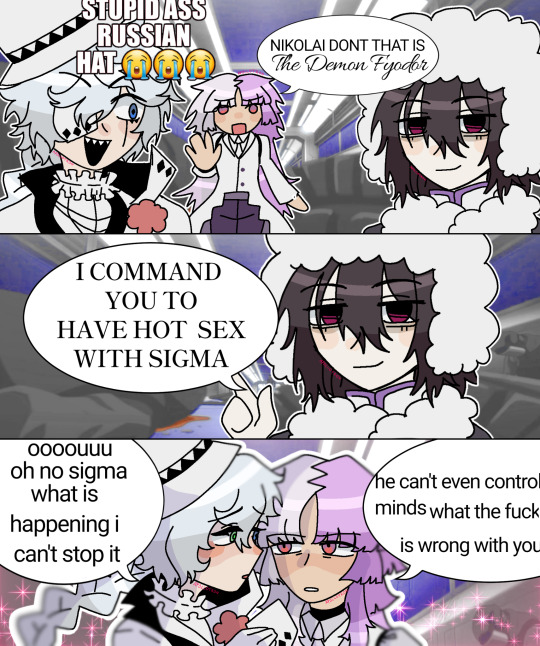
good morning siglai nation
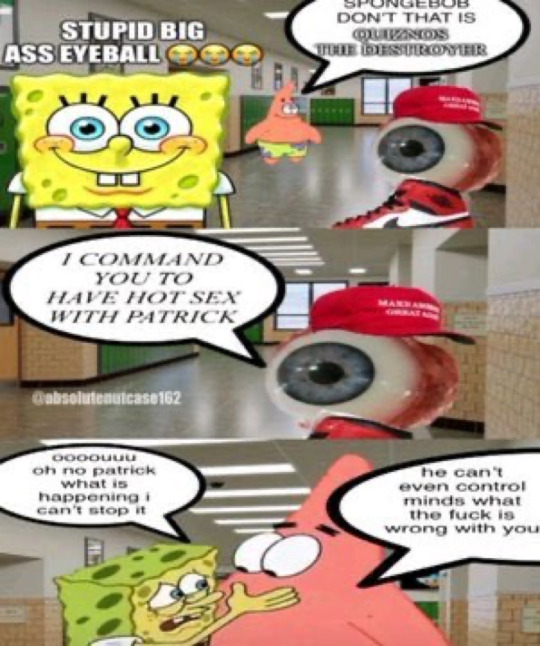
#just in time for valentines day#☆ apollo singing#artpollo#bsd#bungo stray dogs#bungou stray dogs#decay of angels#the decay of angels#doa#bsd fanart#fyodor dostoevsky#nikolai gogol#sigma bsd#sigma#bsd sigma#mykola hohol#siglai#gogsig#bungou gay dogs#bsd meta#bsd dostoevsky#bsd nikolai#bsd fyodor#🕊#decay of the angel#the decay of the angel#blah blah blah
253 notes
·
View notes
Text
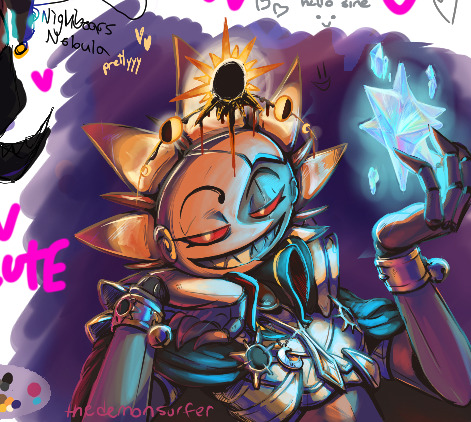
My contribution to the Weekly DCA Magma!
Went from 'what if I drew Eclipse" to "what if I worked on my Lord Elipse!AU design" to "you have been in the magma for 10 hours go to bed". There's things I'd like to change, I want something a bit different for his design than my 'default' DCA, and I'm still not certain about the drips from his crown. But it was a lot of fun!
(If you're wondering 'shit how did you do that in _Magma_: soft eraser at about half opacity and density, soft pen also at half opacity and density, hard pen at full opacity and density. go back and forth between them to get smoother edges. use the lineart as part of the highlights. for the metal i looked up a tutorial)
#fnaf#fnaf sb#fnaf security breach#fnaf daycare attendant#TSAMS#TSAMS lord eclipse#art#i have no idea how i did the star 8'D#i fucked around with it for literally hours doing things to it until it looked like that#for this AU im calling him Apellon#but thats only for like meta posts in the story itself he'll still be Eclipse#Apellon is one of the names of Apollo 8D#PaperCrownAU
630 notes
·
View notes
Text
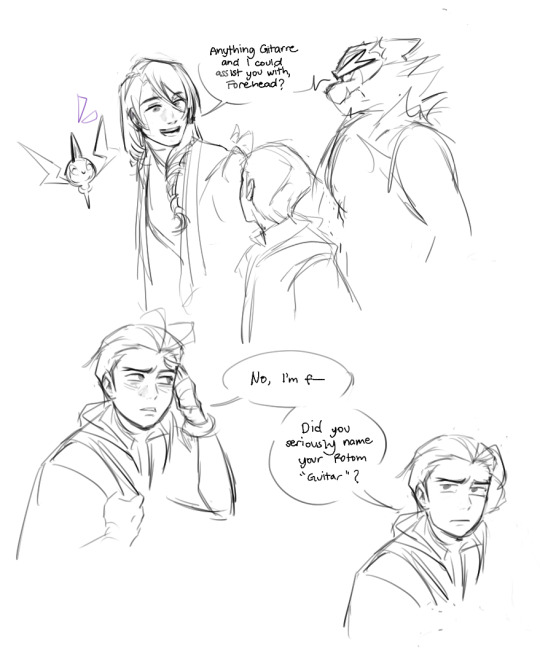
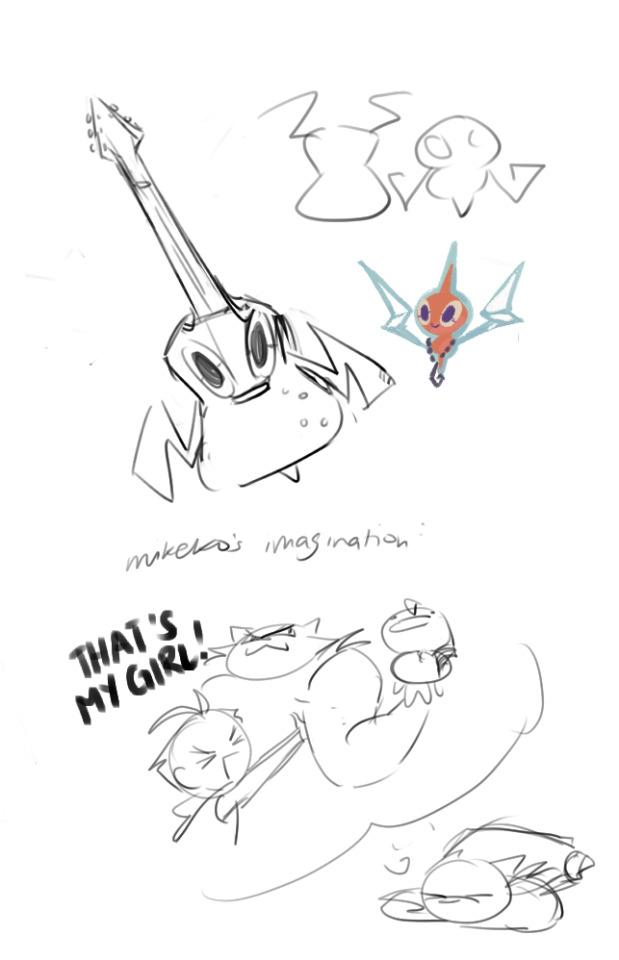
back into pokemon >:3 mikeko's a lil girl bc female starters are rarer. she has darkest lariat-ed klavier at least once. also klavier has 0 naming skills
#klapollo#klavier gavin#apollo justice#ace attorney#pokemon#.png#incineroar loaf.#also did you know that. incineroars are as tall as klavier#i wish they would put incineroar into scarvi for my apollo poketeam but apparently that would ruin the meta</3
950 notes
·
View notes
Text
One criticism I see of Apollo Justice pretty often is that Apollo barely seems affected by his own mentor being revealed as a murderer. And honestly, I don't fully disagree. Kristoph in general is underdeveloped and his only relationship that feels complete is with Phoenix, HOWEVER
I also think this is one of the cases where AJ's flaws seem to add to the story. When things don't fully add up the way they should, the game begs us to ask why that is. I think this is absolutely one of those moments we should ask why this is.
It's because the emotional crux of Apollo's arc in turnabout trump has nothing to do with Kristoph. Sure, he probably looks up to his mentor and respects his skill, but Apollo's lack of emotional reaction to Kristoph's crimes suggests that he doesn't actually care about Kristoph all that much. More than anything, he likely sees Kristoph as a means to an end - becoming an independent, full fledged attorney (like Phoenix Wright) - than an actual bond. He's upset about Kristoph's murders, sure, but less because he actually cares about Kristoph and more because he just lost his job.
Apollo's emotions in turnabout trump are entirely fixated on Phoenix. Kristoph is a good lawyer, sure, but he's not Phoenix Wright. Apollo has been looking up to this idealization he has of phoenix for a good portion of his life. Phoenix Wright, who selflessly fought for the sake of the innocent. Phoenix Wright, who was himself uncorruptible in the face of the horrifically corrupted court system. Phoenix Wright, who valued truth and justice above all else. Apollo holds these values and his image of Phoenix higher than he ever could Kristoph. Partially because Phoenix is legendary and also partially because Phoenix was an idea to him, not a tangible person saying real things to him.
So when Apollo learns that Phoenix is willing to forge evidence, it breaks him. Now, this perfect ideal attorney he looked up to doesn't exist. If he forged evidence here, he could have cheated his way through all his legendary trials. In the dark age of the law, Apollo finally found some truth, some purity he could cling to. But now, it was all a lie, a forgery just like the card. And if even Phoenix Wright can fall to corruption, what hope does the law world have for a better future?
Losing his mentor and job sucked, sure, but he's a little bit too preoccupied with losing his hope and entire worldview for that to matter.
#ace attorney#apollo justice#phoenix wright#kristoph gavin#aj#aa#ace attorney apollo justice#apollo#meta analysis#character analysis#media analysis
313 notes
·
View notes
Text
One of the major themes of ‘Ace Attorney’ has always been trust, obviously. Like, this is the most important creed that Mia Fey passed down to Phoenix and from there to anyone he has touched.
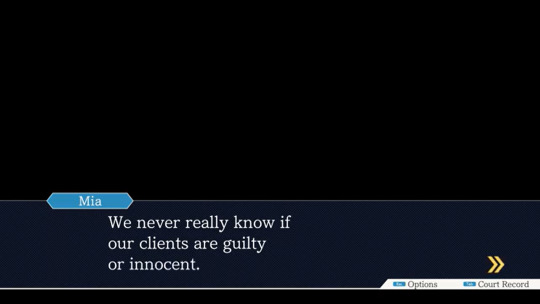
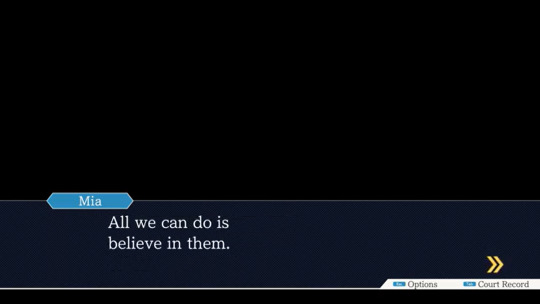
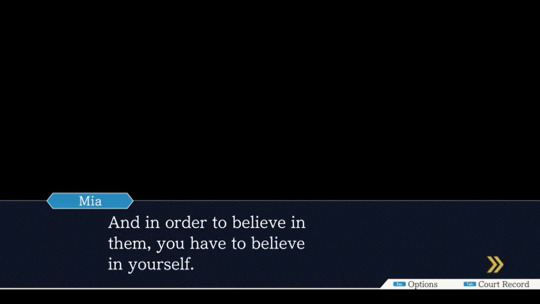
As well as just generally being one of Phoenix’s most important positive qualities.

The entire arc of the first game hinges on the idea of the Power of Trust, with it being a core pillar of Phoenix's relationships with both Miles and Maya.
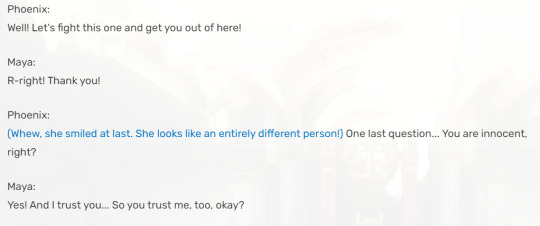

And even the main gameplay themes of ‘turnabout’ and ‘turning your thinking around’ are linked to this theme of Trust. The whole idea around the narrative of a ‘turnabout’ is that the Defendant seems obviously totally guilty, but the defense attorney proves them innocent by Trusting in their innocence.
And ‘turning your thinking around’ is generally framed as - rather than the general mystery-solver mindset of trying to deduce what has happened from the evidence given - trusting in your client’s innocence and looking for evidence that should be there if they are innocent/that other person is the culprit. Using the Trust in the client as the foundation to build your logic from.
And being such a core theme of the franchise, the games started reiterating on and deconstructing it almost immediately. “Farewell, My Turnabout'' having a Guilty Client feels like the most obvious example, maybe. But actually the game starts casting suspicions on Engarde pretty early on, and most of the emotional turmoil related to him is more of the, like “will Phoenix sacrifice the truth for Maya’s sake” hostage situation stuff.
I think the more important stuff in that case is more about the Phoenix-Edgeworth drama. How Phoenix’ sense of trust, which seems like such an unwavering and unbreakable virtue in the first game, does actually have limits. Phoenix feels that Miles has betrayed his trust by, y’know, running off to Europe and making him think he was dead - and it takes him time to learn how to regain this sense of trust in him.
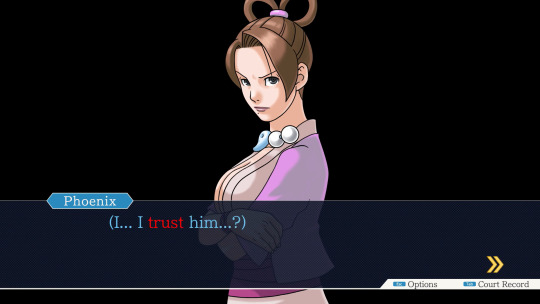
Meanwhile, Matt Engarde, he considers himself strong because he trusts in no one. In contrast to Adrian, who both he and she herself see as ‘weak’ because of her tendency to blindly trust the person she is dependent on. But at the end, it’s Matt’s distrust in everyone around him that brings on his own downfall.
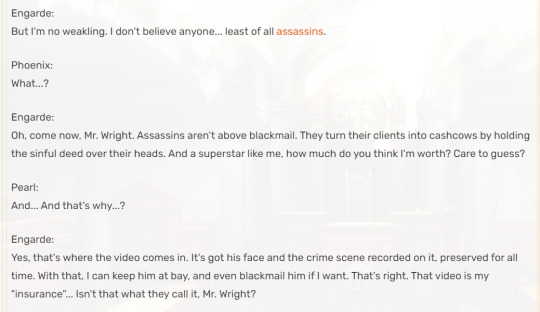
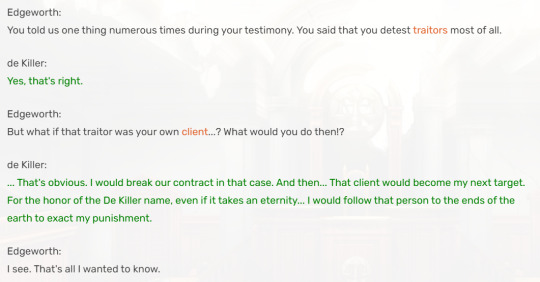
And the game after that adds in Dahlia Hawthorne who is, as Mia Fey’s nemesis, a sort of representation of the dangers of trust. A character who uses and manipulates those who put their trust in her.

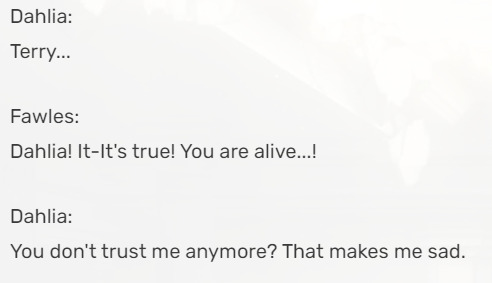

“Apollo Justice: Ace Attorney” establishes its more cynical and deconstructivist tone compared to the original trilogy in part by always putting some sort of element of distrust between the Lawyer and the Defendant. With Apollo basically unable to really have a decent conversation with any of his clients, many of them being antagonistic towards him or hiding things from him. Phoenix Wright was basically the only defendant Apollo went into court actually 100% putting his trust in him… and we all know how that worked out.
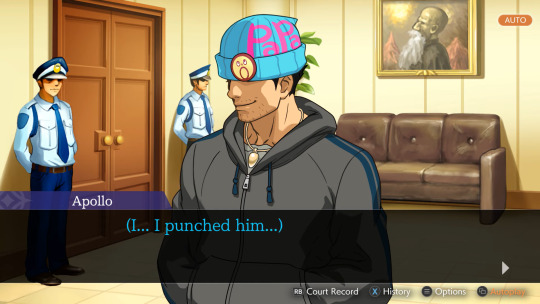
And this moment is especially effective because… if you’re playing this game unspoiled after finishing the Phoenix Wright Trilogy, you probably trust Phoenix as well! The emotions Apollo feels as he sees who Phoenix had become are meant to mirror the emotions the Player probably feels at this very moment. And the hints and questions about what Phoenix did in the trial seven years ago are a challenge to the trust of both Apollo and the Player. Both of them are stuck between what they knew of Phoenix before and the revelation of what Phoenix confessed to in “Turnabout Trump”. Apollo’s uncertainty is the player’s uncertainty as well.
And even if Apollo’s image of Phoenix is somewhat improved by “Turnabout Successions” and it’s clearly established that, no, Phoenix never knowingly used forged evidence as an attorney… There’s no big reconciliation that fixes everything like with Phoenix and Miles. It’s clear that Apollo’s sense of trust, in Phoenix Wright and in general, never quite recovered from the events of AJAA. Later games do still reiterate that he’s a lot more distrustful than other playable attorneys.
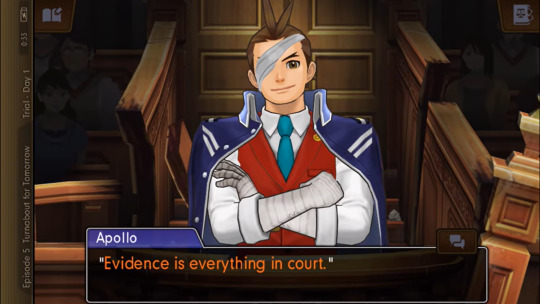
(And that’s also a point where the Player-Player Character Synergy from ‘Turnabout Trump’ kinda diverges, since I think most Players do regain their trust in Phoenix by the end of AA4 at least. Especially as unlike Apollo, we actually got to be inside his head again - that’s not exactly an experience Apollo will ever get to have. )
But, well, maybe it’s because it’s just really fresh in my mind, but I just think what ‘The Great Ace Attorney’ Duology does with this theme is just… really cool!
These games really play on the idea of challenging the trust… not just of the Player Character Ryunosuke, but also of the Player themselves. Because Ryunosuke also gets to have a Guilty Client… as his very-first actual client who is not himself. And since the game doesn’t lay on the suspicion quite as thick as with Matt Engarde, and since there’s no hostage situation of course… This plotline can have emotional synergy between the Player and the Player Character and focus a lot more about the emotional repercussion of putting your trust in someone totally absolutely unworthy of trust.
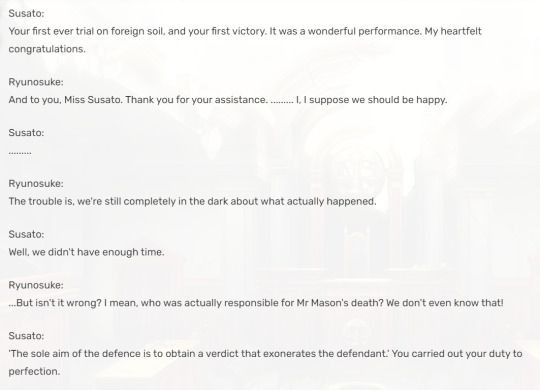
And how this betrayal of trust haunts the characters moving forwards. How Ryunosuke now finds himself being held back by his doubts due to the memories of this terrible trial, and... not necessarily a lack of trust in others as much as a lack of trust in himself. How Susato is driven to do something she considers unforgivable - tempering with the Crime Scene behind the police’s back - because that trial had made her lose trust in the entire British Justice System.

The entire climax of the first game is thus a reaffirmation of the power of trust. By unwaveringly defending Gina - a girl they have bonded with, but has also been extremely uncooperative, shady, dishonest and literally involved in what went down in the McGilded Trial, in a very grueling and seemingly unbeatable trial - Ryunosuke and Susato rediscover their ability to trust their defendant. Because, yeah, trust is a leap of faith - you never know when you’re gonna meet a McGilded or a Dahlia Hawthorne - but it’s also absolutely worth it.

And then with the themes of conspiracy strawn throughout the games and especially ramping up in the second game, that’s really kinda a thing that’s bound to sow seeds of paranoia and distrust in the Players about… all sorts of characters. Like, okay, I am fairly sure that pretty much every player who first walked into the Lord Chief Justice’s office and saw Mael Stronghart was like “Oh look! That’s the Final Boss!”. But with the hints for there being some sort of web of intrigue being hidden in the shadows, there’s plenty of other characters that skirt the line between feeling suspicious and trustworthy. The reveal that Seishiro Jigoku is actually a culprit was one of the best-done reveals in the whole franchise. And on the other hand, there are many reasons to be suspicious of Yujin due to the amount of secrets he clearly keeps, and yet he turns out to be a very straightforwardly heroic character.
And then there’s Kazuma. And Mael Stronghart might be the Obvious Final Boss to the Conspiracy and Murder Mystery parts of the game, but within this thematic throughline of the challenges of trust, Kazuma is pretty much that part’s Final Boss.
Initially designed to be someone both the characters and the players intently trust, both in terms of the meta-perspective of how he’s set up to be a kinda Mia-Miles hybrid and any Player with knowledge of the previous games will know that’s a kind of person you can rely on. And in general, even to newcomers, everything he says and does in the first two chapters of the game make him feel like just a very upstanding guy you can trust.
Then, when he comes back in the second games, he comes back with a new attitude that feels colder towards Ryunosuke (and thus the Player) and that’s also coupled with a whole bunch of mysteries about him that were hinted in the previous game, but are now coming to the forefront.
And as the Trial of Barok Van Zieks progresses, it becomes increasingly clear that Karuma has, theoretically, all the possible motivation to kill Greyson and frame Barok for it, that he was one of the last people to see Gregson before his death and that he literally brandished a sword at him. And despite how cagey and shady he acts, he still insists he never killed anyone.
And the reveal that he has knowingly participated in an assassination plot behind the backs of both Ryunosuke and Susato is bound to cause a feeling of shock, confusion and betrayal not just in these characters - but also in the Player. The Player and Player Characters are in a lot of emotional synergy through this entire Kazuma storyline. These feelings of conflict between wanting to trust Kazuma after seeing him in his best and all the mounting suspicions due to all the revelations about him are really felt by all three of us.
And in the end the challenge for Ryunosuke and Susato is not to abandon Kazuma completely, and it’s not to continue blindly trusting their old idealized view of Kazuma - it’s to face the fact that he has kinda lost his way for single-minded revenge, while also still trusting that he is deep-down the same good not-murdery man they have known him as before.
#ace attorney#the great ace attorney#great ace attorney#gyakuten saiban#dai gyakuten saiban#dai gyatuken saiban#tgaa#tgaac#tgaa2#ryuunosuke naruhodou#kazuma asogi#ryunosuke naruhodo#gaac#dgs#dgs2#dgs sherlock holmes#tgaa chronicles#tgaa 2#aa#pwaa#phoenix wright#phoenix wright ace attorney#aa meta#ace attorney meta#phoenix wright trilogy#aa trilogy#ace attorney trilogy#apollo justice ace attorney#food#phoenix wright: ace attorney
137 notes
·
View notes
Text
the fact that Percy Jackson as an individual has just chugged gallons of respect women juice throughout his lifetime
Literal gallons
#percy pjo#percy jackon and the olympians#percy jackson#percy series#pjo meta#pjo series#pjo#pjo apollo#pjo disney+#pjo fandom#pjo headcanon#pjo hoo toa#pjo stuff#pjo tv show#pjoverse#sally jackson#“It had to be good manners to walk her to the start of her epic solo death quest.”#SIR#PLEASE#percy and annabeth#annabeth chase#annabeth pjo
750 notes
·
View notes
Text

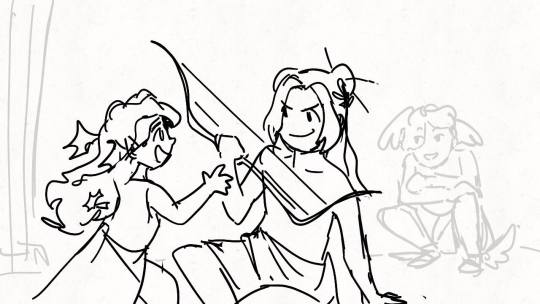
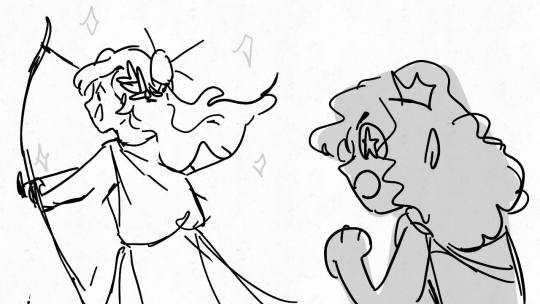
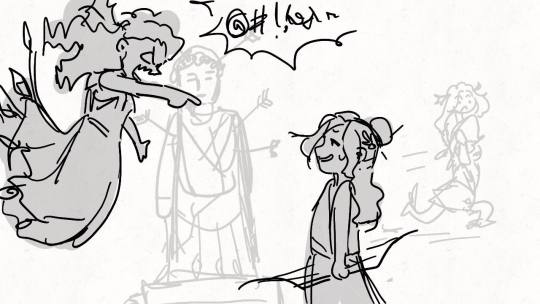
I just wanted to talk about this scene and my headcanons.
This is young Dio being sad after Hera was a jerk to him. And big bro Apollo saw and decided to help him cheer up by using a statue of Hera as target practice. He then told Hera it was his idea only so Dio wouldn't get into trouble.
Hera honestly made their childhoods hell so they have a shared bond about it. And Apollo gets were Dio is coming from. As well, young Dio had a hero worship of his older brother, cause he seemed so cool, funny and put together. He wanted to be like Apollo in every way. Older Dio became more jaded, angry and envious after he saw Father would always favour Apollo and compare them. And how Apollo always wanted to be perfect and bragged about it, but Dio was never good enough for Zeus. Eventually this led to a rift and in the years of pjo they have not been close in a while.
But, a sad part I imagine is that Apollo tried to shield them from the abuse of Zeus as much as possible, to the point where he often took the blame for their mistakes without them knowing. (u can see his habit of it above with Hera) He thought that at least as Zeus' favourite he would be punished less severely (only half true).
This also had the unintentional side effect of Hermes and Dio getting a more lenient view of Zeus, which also kinda made Apollo withdraw even more into a mask. RIP.
Dio definitely changed how he viewed Apollo after TOA. He realized Apollo wasn't so perfect and was a mess just like him. So I think they would have a bonding moment like in the animatic.
#mine#lester papadopoulos#trials of apollo#my art#pjo apollo#pjo dionysus#percy jackson and the olympians#Meta#my animatic
136 notes
·
View notes
Text
I've been thinking about this for a while but like. The gods don't have a human conscience. And I know that's obvious, but the closer you look, you realize that they don't really feel emotions the same way humans do. They don't comprehend time, or death, or love in the same way that humans do. Apollo tells us he's lost track of centuries and forgets that people from thousands of years ago are dead and gone. The gods are incapable of change because they have no reason to do so, and few to no consequences if they don't.
When Apollo is turned mortal he is annoyed, sure. But he has trouble getting the concept of mortality through his head. He's seen thousands of people die- heck, he himself has brought plagues upon cities and set his wrath upon his mortal enemies with no hesitation. But humans to gods are playthings.
And so it isn't until he loses Jason, someone he knows, his half brother, that he understands true loss. He laments Hyacinthus and Daphne, but it was his own godly power that caused their demise- his wrath and jealousy. It was infatuation, sure. But did he really know what love was before he was cast down from Olympus?
Jason doesn't only die, but actively sacrifices himself to save Apollo. This is also moments after Apollo tried yet failed to kill himself instead, and it was in part this failure that led to Jason's death. This is a wound of guilt that eats away at Apollo for the rest of the series, and the lasting effects of grief are shown masterfully in the remaining books, with tears and breakdowns occuring seemingly at random, with overwhelming gratefulness at simple acts of kindness, and with the lingering sense of something missing.
Out of all of the remaining gods, it is probably Artemis who understands grief and other human emotions as closely, since she spends most of her time among born mortals in the human world. When she loses one of hunters, she shares in grief with the rest of her troop. She is in touch with the mortal world, I think, as much as a god can be.
And, as an honorable mention, Hestia- who is used to being overlooked and forgotten but is always ready to offer a smile and a warm meal to anyone in need. I think she understands isolation and loneliness as much as any human, and regularly appears in the mortal world to organize soup kitchens and food pantries for those who are struggling. That's just a headcanon though :)
I hope you enjoyed reading this, I've been itching to get these thoughts out for a while.
#trials of apollo#toa#trials of apollo analysis#toa analysis#toa meta#lester papadopoulos#apollo pjo#pjo#percy jackson and the olympians#jason grace#heroes of olympus#meta#analysis#jess's thoughts#pjo meta
279 notes
·
View notes
Text

"Evidence is everything."
183 notes
·
View notes
Text
My Seven Year Gap narumitsu headcanon is that not only did Miles help Phoenix build the MASON, he actually became chief prosecutor with the objective of helping him instaurate the jurist system.
By the time Trials and Tribulations comes around, I feel like the two of them are in a point in their relationship where they aren't too prone to angsting about each other. They trust each other fully. So when Phoenix pushes Miles away, Miles assumes it's for a good reason, even if it still hurts.
He does tell Miles eventually, in that mythical trip to Europe, when he knows for ceirtain Kristoph can't hear him (the guy probably keeps track of his phone calls bank accounts and has his house bugged as all hell because he's insane like that). He still doesn't tell Miles how bad he's struggling emotionally, and how the reason he's drinking so much grape juice is because he struggled with horrible depression alcoholism, particularly early in his disbarment. He just tells him about Kristoph and the Gramarye trial and how he's trying to connect the dots and find the truth and clear his name.
And you know what Edgeworth does? He tells him, "So, basically, you want to fundamentally change the way the Japanifornian justice system works. Wright, you are fucking insane. And I must be insane too because of course by god I'm going to help you." After all, foreign justice systems are his expertise. He's been studying this shit for years, and he finally gets a chance to put that knowledge to use.
It's hard for them to get any work done without Kristoph suspecting them, of course, but by some miracle they manage it. Edgeworth applies for a position as chief prosecutor a year or two before the events of Apollo Justice, explicitly because he wants to amass enough political power to implement their silly little project. When the disgraced former defense attorney comes one day with an insane outline of how to reform the entire court system no one dares to reject him, because he's already got chief prosecutor Miles Edgeworth in his pocket.
Smooth. As. Fuck.
They have spent years planning and scheming and it has finally come to this. Their professional relationship is blooming. Their personal relationship... Well, they're not in bad terms by any means but like, come on. These two are extremely emotionally repressed so it's not like they are going to openly declare their undying loyalty to each other and get married or something. But they are perfectly capable of working in harmony with each other, and that's as good as either of them think they're going to get.
I feel like this time line of events makes sense. I don't see Phoenix building MASON alone, let alone implement it. He doesn't have that sort of clout or analytical mind. But Edgeworth does. It's just a testament to how compatible they are that they are able to work together to find the truth™ and change things for the better. Shipping aside, I just think that's really cool.
#ace attorney#apollo justice#aa4#narumitsu#wrightworth#aa meta#miles edgeworth#disbarred phoenix wright#phoenix wright
73 notes
·
View notes